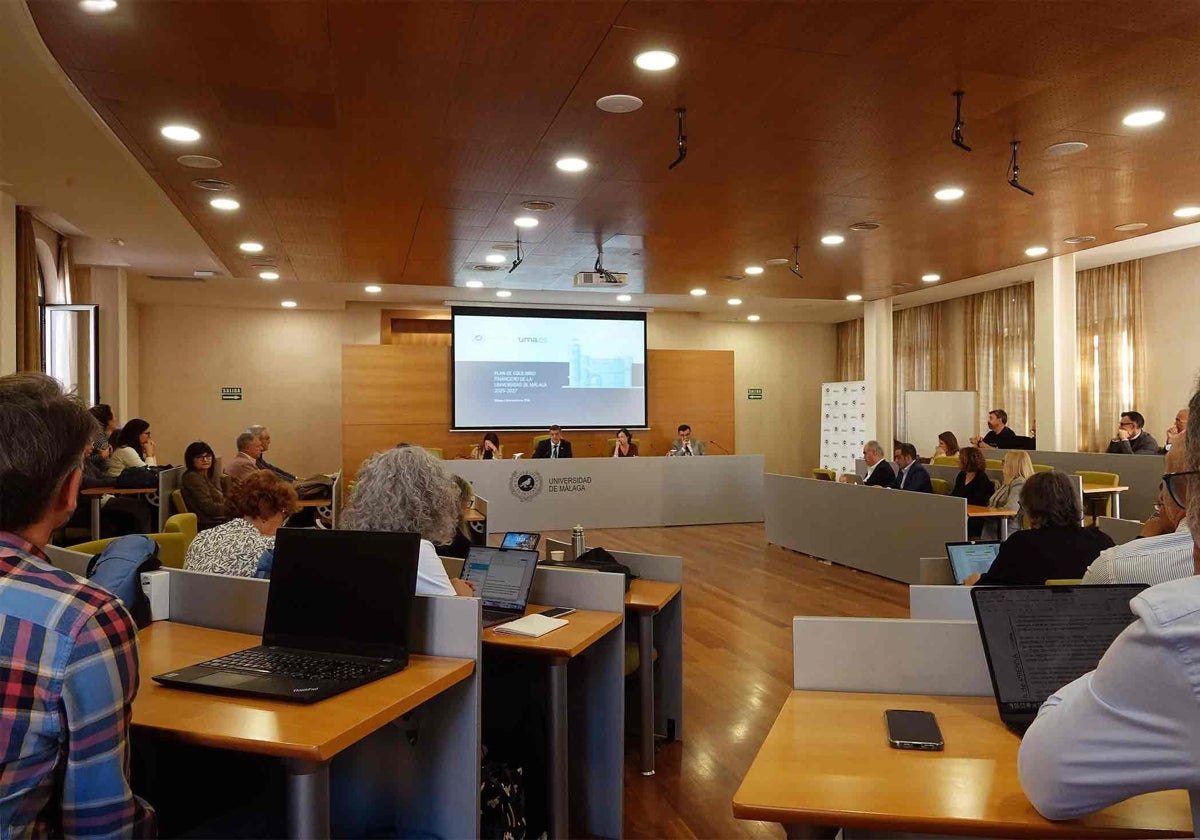University of Malaga must slash 20 million euros off its current deficit between now and 2028 to comply with bailout plan
After the initial three-year period of grace, the UMA Malaga will have to stump up three million euros a year to repay the 48.5 million-euro loan from the Junta de Andalucía
The governing council of the University of Malaga (UMA) met on Tuesday this week to discuss the main threads of a "financial stability plan" that it has committed to implement with the Junta de Andalucía in exchange for the regional government's loan of 48.5 million euros, enabling the university to pay its outstanding and upcoming debts with construction companies and to alleviate its complicated financial situation.
This adjustment plan, which must first be approved by the social council (similar to a school board of governors including outside interested parties from society - business, politics and trade unions) of the UMA and then receive Junta approval as required by the Organic Law of the university system, aims to lead the institution to a budget surplus within three years. Therefore, by 2028, it will be in a position to start repaying the aforementioned loan, which will mean a loan repayment bill of 3 million euros per year from then on. The UMA must take advantage of this three-year grace period to do its homework: it has to reduce expenditure and increase revenue in order to cut 20 million euros off its current deficit.
"It is a complicated task", acknowledged the rector of UMA, Teo López, in a statement to SUR, explaining that the adjustment plan will affect "both income and expenditure" in order to return to the path of financial equilibrium.
A 12-million overspend on staffing
Starting with the adjustment to ongoing costs, the motherload is in chapter 1 of the plan: personnel. One snippet of information gives an idea of the importance of this section: the UMA allocates 12 million euros more to staffing costs than its expenditure ceiling. The way to cut this excess is by reducing the replacement rate for staff in teaching and research, technical, management, administrative and service roles. What does this mean? It means that, for at least the next three years, a large part of staff roles opening up through retirement will no longer be replaced. In fact, it is likely that the replacement rate will fall below 50%. However, López made it clear that they would take advantage of the Mari Goyri programme, which enables the UMA to look at incorporating some assistant professors at little extra cost.
With regard to the Plan de Ordenación Docente (POD, better known as the teaching schedule), which sets out, among other things, the teaching hours to be completed by academic staff, the rector does not expect to have to make changes to the one being applied this academic year, given that it already involves an increase of 20 hours compared to the previous year. Therefore he is of the view that, in this respect, the UMA "has already done its homework" in advance. However, he does not rule out the possibility of having to adjust this planning again "if circumstances require it."
Besides reducing staff costs there will be a reduction in current expenditure mainly in the areas of supplies, per diems (expenses with set daily rates) and other current expenses, as well as a rationalisation of expenditure in different areas of management, in order to "guarantee a more efficient distribution of available resources."
Boosting revenue through public-private partnerships
The rector also reported on the main strategies to increase income for the university, which are along the lines of promoting public-private partnerships as much as possible, tendering concessions to exploit UMA buildings or services in order to generate recurring income. In addition, a "major energy-saving plan" will be addressed.
One of the most important of these new revenue streams is the construction of a new student hall of residence with between 800 and 1,000 places (part of the extension of the Teatinos campus), which is expected to be put out to tender by the end of this year, once it has been approved by the Social Council. According to the vice-rector for Infrastructures and Sustainability, Salvador Merino, the conditions foreseen include that the company that wins the concession will pay 8 million euros in the first three years and, thereafter, 140,000 euros per year plus any increases corresponding to the CPI (consumer price index). The contract for managing the hall of residence will be for 75 years.
The institution will also renew the tender for the Jiménez Fraud student residence for the 2025/2026 academic year, which will increase its income. In addition, authorisation has been requested to make better use of the plot of land known as La Máquina Grande , with the aim of turning it into a car park thanks to its location near the airport, which would open up a new source of income for the university.
Progress has also been made on the tender for the 'paraninfo' (the main ceremonial hall of some Spanish universities, often used for graduations) of the new Pabellón del Gobierno pavilion. Its use will be agreed with a private company interested in using it for cultural events, thus generating additional income. Other projects, such as the implementation of a high performance centre for sports and the revision of agreements for the use of different buildings that form part of the university's heritage, such as El Palo and Martiricos, will also bring more money into university coffers.
More than half of the Junta's loan will be used to pay off the outstanding construction work in the Faculty of Tourism.
The rector of the UMA, Teo López, detailed to the members of the governing council the conditions of the loan that the Junta is going to give it: the amount of 48.5 million euros, an interest rate of 1%, a grace period of three years and a repayment period of 21 years. He also explained that this economic injection will be a final 'fix', destined to cover the "temporary deficit" brought about by the pending payments for the construction of two faculties. Of this amount 27 million euros will be used to complete the work on the Faculty of Tourism (the construction company Acciona is suing the UMA in court for this amount), 17 million euros for the Faculty of Philosophy and Arts, and the rest will be used to complete the work on the university boulevard.

